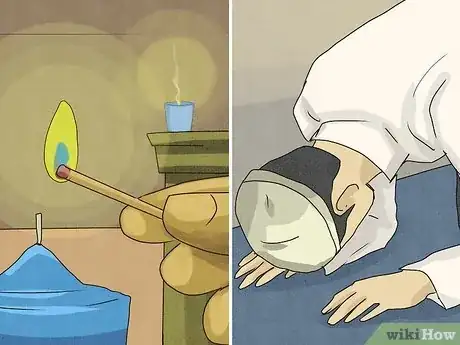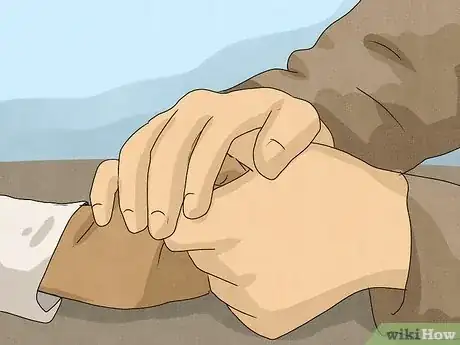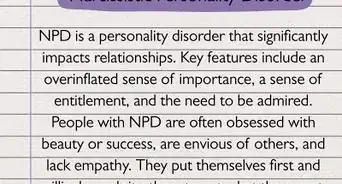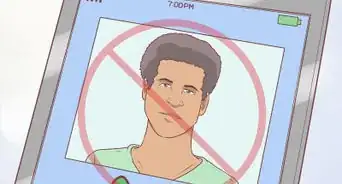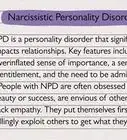This article was written by Adam Dorsay, PsyD and by wikiHow staff writer, Madeleine Criglow. Dr. Adam Dorsay is a licensed psychologist in private practice in San Jose, CA, and the co-creator of Project Reciprocity, an international program at Facebook's Headquarters, and a consultant with Digital Ocean’s Safety Team. He specializes in assisting high-achieving adults with relationship issues, stress reduction, anxiety, and attaining more happiness in their lives. In 2016 he gave a well-watched TEDx talk about men and emotions. Dr. Dorsay has a M.A. in Counseling from Santa Clara University and received his doctorate in Clinical Psychology in 2008.
This article has been viewed 7,385 times.
People who live with Narcissistic Personality Disorder are capable of causing a lot of pain and chaos in your life, but turning to spirituality can be a meaningful way to cope. Whether you're trying to set boundaries with a narcissist, leave your relationship, or heal from their past wounds, this article is here to help you deal with their behavior from a spiritual perspective. We'll also provide a breakdown of how a narcissist might damage your spiritual self so that you can take steps to rebuild it and emerge stronger than before.
This article is based on an interview with our licensed psychologist, Adam Dorsay. Check out the full interview here.
Steps
How do narcissists damage your spirituality?
-
1Narcissists cause you to lose your sense of self. A narcissist's constant criticism can make you stop believing in yourself, your talents, and your goals, which is a spiritual threat to your health and happiness. People with NPD will often belittle you, insult you, and humiliate you in front of others. Their poor treatment can leave you feeling insecure and unloved, and they do this to make it easier to manipulate and control you.
- Someone with NPD might belittle your interests to make themselves feel superior. If you take an interest in reading philosophy, for example, they might say something like, "Why would you want to read that?"
-
2Narcissists encourage you to ignore your intuition. Someone with NPD may use manipulation and gaslighting to make you question your reality. This can damage your relationship with your spiritual self, as you may stop listening to your inner voice. Even if you confront the narcissist, they will disregard your perspective, lie, and place the blame on you so that you will keep ignoring your gut feelings.
- If you confront a narcissist about being unfaithful, they may lie and accuse you of bad behavior so that you will question yourself instead. They might say, "I can't believe you would accuse me of that. You're so controlling and jealous."
Advertisement -
3Spiritual narcissists damage your relationship with your faith. If someone is a spiritual narcissist, they may believe that their spiritual knowledge gives them the authority to talk down to you and control you.[1] This form of manipulation can make you question not only yourself but your relationship with your spirituality or religion as well.
- A spiritual narcissist might use spiritual text to justify why they are always right. Or, they might act like they are superior because they have a deeper relationship with a higher power.
Using Spirituality to Deal with a Narcissist
-
1Practice self-compassion and love yourself. If you are a spiritual person, you may believe in practicing compassion for everyone, even people that have hurt you. Consciously or not, someone with NPD may take advantage of your empathy and kindness. That's why it's important to have compassion for yourself, too. Rather than focusing on taking care of your narcissistic friend, partner, or family member, redirect that kindness and take care of yourself.[2]
- If the narcissist in your life makes you feel like you're a bad person, don't believe them. You might think to yourself, "I may not be perfect, but I try my best to always be kind."
- If you left a narcissist and feel guilty, treat yourself with compassion. You might think, "I did everything I could to be a good friend to them, but I have to take care of myself now."
-
2Set loving boundaries. Saying "no" to someone with NPD can be very hard, but it's absolutely necessary for the sake of your spiritual and emotional well-being. To establish boundaries, consider what you need to feel safe and happy. Then, calmly communicate those needs to the narcissist in your life, and be firm. If you waver or don't make your boundaries 100% clear, a narcissist may not respect them.
- To set boundaries with a narcissistic parent, you might say, "Next time you criticize me in front of my kids, I expect an apology. If you don't apologize, the kids and I will go home."
- It's possible the narcissist still won't respect your boundaries after making them clear. This is not your fault. If this happens, it may be time to reconsider your relationship and minimize the time you spend with them if you can.
-
3Accept the narcissist for who they are. One of the most tragic aspects of NPD is that those with the personality disorder rarely change. As a spiritual person, you may believe in seeing the potential in everyone. If you're dealing with a narcissist, it's important that you don't confuse this belief with believing that you can change someone. To bring yourself peace, remember that the narcissist has to change on their own and that their behavior is out of your control.
- If a narcissist is treating you badly, you might think that showing them kindness and love will make them treat you better. Unfortunately, there is often no amount of love that can convince a narcissist to treat you with love and respect.
-
4Consider the spiritual lessons the narcissist may have taught you. If you have been mistreated, one way to reframe your experience is to look at what it has taught you about yourself.[3] Learning from the experience does not mean you have to continue enduring abuse, though. Try to focus on what the experience means for your spiritual growth while also getting the space you need to heal and feel safe.
- As challenging as it may be, dealing with a narcissist can teach you how to set boundaries and prioritize your own wellbeing.
- Identifying a narcissist in your life can also help you spot the signs of narcissism in others much earlier so that you can avoid getting close to them.
-
5Practice gratitude. To deal with a narcissist or the damage they inflicted, try redirecting your attention towards the good things in your life. Think of family, friends, and coworkers that do treat you with love and respect. Consider the activities and passions that leave you feeling whole, like praying, meditating, volunteering, and making art. These are things the narcissist can never take away.
- If you recently left a narcissist, remind yourself of the supportive friends that are here to build you up again. Or, think of the activities that can still bring you joy, like painting, playing music, or spending time in nature.
-
6Maintain a spiritual practice to cope. Even if you're not religious, there are several ways to be more spiritual that can help you deal with a narcissist. Examining your life's meaning, appreciating nature, and relinquishing control are all spiritual practices.[4] These can all help you refocus your time and attention away from what has hurt you to something more fulfilling and joyful.[5]
- To grow spiritually and seek support, join a spiritual community. Try visiting a local church or religious community.
- If you're not religious, volunteer to help your community and spend time with others.
-
7Forgive the narcissist so that you can heal and move forward. As a spiritual person, you likely believe in forgiveness. It can be very hard to forgive someone who has hurt you, but it may help to realize that forgiving someone does not mean you have to reconnect or even tell them at all. Empathizing with their point of view and letting go of resentment can help you take their behavior less personally and feel able to move on with your life.[6]
- To make forgiveness easier, try writing out your feelings in a journal. Let out all of your feelings of hurt, anger, and frustration. This can help you symbolically let go of the pain they caused you.
- Forgiveness takes time. If you don't feel ready to forgive this person yet, that's okay. You might try making it a goal to forgive them in the future instead.
References
- ↑ https://www.psychologytoday.com/us/blog/spiritual-narcissism/202101/spiritual-narcissism
- ↑ https://www.spiritualityhealth.com/articles/2014/07/15/how-practice-self-compassion
- ↑ https://www.psychologytoday.com/us/blog/click-here-happiness/201806/7-ways-make-meaning-hardship
- ↑ https://www.takingcharge.csh.umn.edu/what-spirituality
- ↑ https://www.psychologytoday.com/us/blog/ending-addiction-good/201602/four-ways-spirituality-can-help-you-cope-difficulty
- ↑ https://www.mayoclinic.org/healthy-lifestyle/adult-health/in-depth/forgiveness/art-20047692








